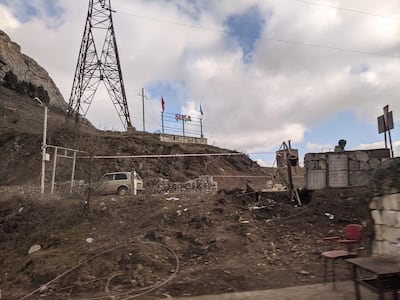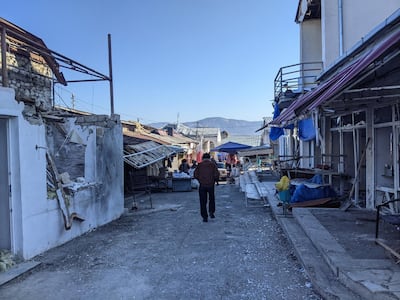The latest war between Armenia and Azerbaijan over Nagorno-Karabakh may be over, but "normality" has not returned to the region.
In many ways, it never will.
This is clearly visible along the road to the capital, Stepanakert, as it passes by the entrance to Shushi, a city a few kilometres away. After half a dozen sandbagged Russian peacekeeping positions, a large new sign emblazoned with the city's Azerbaijani name, Shusha, and flanked by the flags of Azerbaijan and Turkey. Russian troops guide vehicles past two fortified Azerbaijani checkpoints, with heavily armed Azerbaijani soldiers a few hundred metres away. Stepanakert, and indeed Karabakh, still feels like it is under siege.

In Stepanakert, life has returned with startling speed. Barely three weeks since the entire capital was emptied of civilians as Azerbaijani forces closed in during the waning days of the war, the streets are once again packed with people. Stores are stocked and operating, streets have been cleared of debris, and although Armenian Karabakh soldiers in uniform are still omnipresent, so too are civilians going about their lives.
The veneer of normality is misleading. The first conversations with locals reveal that life now is nothing like it was before.
There are two main centres of life in Stepanakert these days. One is the social affairs office, where people gather to receive a one-time relief payment of 83,000 dram, roughly $170, from the Armenian Karabakh administration.
Mikael, 71, is a retiree from the village of Vazgenashen, which has since reassumed it Azerbaijani name, Gyulably. It was handed over to Azerbaijani control as part of Agdam region on November 20, as one of the conditions of the ceasefire deal.
“The clothes you see me in are all I have,” Mikael says, rubbing his hands to keep warm in the cold morning air. “We don’t have a home, we hardly have any of our possessions. We barely have our lives, and who knows for how much longer,” he adds grimly.

Asya Arushudyan, a 26-year-old teacher of Russian and mother of three, has similar problems despite being two generations younger.
“I am happy we were able to return to our country,” she says with a cautious smile. “But we are still afraid. The Azerbaijanis are right there,” she says, pointing in the direction of Shushi, visible on a high hillside just a few kilometres away.
Ella Mirzoyan, a 53-year-old schoolteacher, captures the mood. “We’re still afraid,” she says, having just returned to Stepanakert after leaving on the first day of the war, September 27. “I hope the Russians will be able to protect us.”
"The Russians" are the topic of the moment in Karabakh these days.
Russia has officially deployed just under 2,000 peacekeepers to Karabakh, along with 90 combat vehicles and 360 other vehicles. Inside Stepanakert, they are more of an occasional sight: a Russian humvee might pass by an intersection, its tricolour waving conspicuously from the hood.
Outside the capital, it is a different story. Russian armoured vehicles and emplacements are everywhere, with small – and sometimes large – convoys constantly traversing the landscape.
“I think the Russians have brought 2,000 BTRs alone,” jokes Vazgen, a taxi driver, referring to the Russian infantry fighting vehicle that is now a ubiquitous feature of Karabakh’s roads.
The Russians are all many people feel they have left to place their hope in.

Conversations at Stepanakert’s marketplace, the other main congregation point, revolve around two topics: betrayal by Armenian authorities, and the salvation to be found in Moscow.
Silva, 53, is a fixture at the market, where she is one of a number of women selling "zhingyalov hats", the herb-stuffed flatbread considered Karabakh’s national dish.
She does not mince words when discussing the outcome of the war, and her opinion of Nikol Pashinyan, Armenia’s prime minister.
“Pashinyan did this,” she says. “He sold us. He brought everyone to Yerevan so he could sell us to the Turks,” she said, referring to the November 8 evacuation of civilians from Stepanakert.
The loss of swathes of Armenian-populated land in Karabakh as a result of the military defeat and truce deal is a particular source of anger.
Mr Pashinyan "should have made some diplomatic deal at the start, if that’s what was necessary”, Silva says.
“He could have given back the seven regions,” she adds, referring to Azerbaijani territory surrounding Karabakh that Armenian forces occupied in the first war from 1988-94 and held until October.
“Instead, he has now also given regions where Armenians have lived for thousands of years. You can walk on the street and see people from Hadrut, from Martuni and Martakert. They have nothing,” she says, referring to areas Armenian-majority areas fully or partially handed over to Azerbaijan.
Like others, she sees Karabakh’s only hope in Russia.
“If the Russians weren’t here now, then we wouldn’t have come back,” she says. “Russia is our saviour.”
Others go yet further in their hopes for Russia, among them Karine Aghajanyan, a 46-year-old salon worker who says her house was hit by Azerbaijanis bombardment on November 8.
“I came here from Baku in 1989. Now the Azerbaijanis have come here for me, too,” Ms Aghajanyan says.
“Honestly, I hope that Russia will just make us like Abkhazia,” she says, referring to another breakaway enclave in the Caucasus whose self-declared independence Russia has recognised and whose citizens have been granted Russian passports.
“We can just become a province of Russia. I have no problem with that.”
For Ms Aghajanyan, and others, the lost war showed that Armenia cannot guarantee Karabakh’s security – and that Russia is the only protector left.
“Our army fought so hard. I am so proud of our soldiers,” she says.
“But obviously Nikol [Pashinyan] could not defend us. So, let Russia do it. We are better off with them anyway.”











